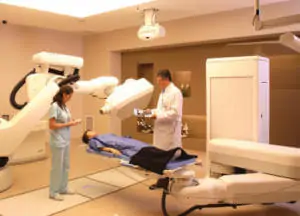Radiation (radiotherapy) is dangerous, with negative consequences that can be detected even before its completion. Under the influence of ionizing radiation, the functioning of many internal organs, including the liver, kidneys, and gastrointestinal tract, is disrupted. The patient suffers from digestive disorders and excessive hair loss. But therapeutic procedures are especially dangerous for skin that loses its protective functions. Therefore, long-term rehabilitation is necessary after irradiation. It is aimed at restoring the patient’s body and eliminating any complications that have arisen.
The content of the articleWhat is radiation therapy?
Radiotherapy is a method of antitumor treatment based on the use of ionizing radiation. In oncological practice, it is considered one of the most effective ways to reduce the size of malignant neoplasms, regardless of their morphological structure and location. Radiation can be used as monotherapy or in combination with chemotherapy, radical surgery, and hormone therapy.
During the treatment, damage occurs to the genetic apparatus of mutated cells. Their replication becomes impossible, as does the growth of a dangerous tumor. Thus, the effect on the human body is used to stop oncological processes. Cases of complete recovery are not uncommon, but almost all patients exposed to radiation have to face negative consequences of treatment.
Types and methods
Depending on what type of ionization radiation is used, several types of therapy are distinguished. The greatest therapeutic effectiveness is typical for the following methods:
-
Reduced side effects
Like chemotherapy, radiotherapy for oncology often becomes the first choice technique. It is especially often used for metastatic tumors, when tumors are localized in hard-to-reach places. In the latter case, surgeons cannot perform operations or use laser systems to excise basiliomas and other modified tissues.
Radiation radiotherapy is carried out under certain conditions to prevent negative consequences as much as possible:
- irradiation is not performed immediately, but in several stages to adapt the body to such a load;
- malignant neoplasms are affected from different directions, so that any specific area of the body is not exposed to excessively strong radiation;
- During a radiotherapy session, protective screens are used to prevent exposure of healthy areas of the body to dangerous rays.
All cancer patients are irradiated in special units, and their well-being is monitored by doctors and junior medical staff. During the treatment process, patients do not experience any discomfort. Only after a few hours may nausea appear, often ending in an attack of vomiting.
There is usually no increase in temperature during radiation and chemotherapy. It is possible after its completion as a result of decreased immunity. The body's ability to resist various infections decreases. That is why, after a course of radiotherapy, many patients suffer from frequent colds.
Recovery
Rehabilitation after surgery and (or) chemoradiotherapy involves a course of pharmacological medications, physiotherapeutic procedures, and regular exercise therapy. At the end of the irradiation, diagnostic measures are carried out, the results of which make it possible to detect the dangerous consequences of such treatment of oncological pathologies. At the initial stage of rehabilitation, the organ directly exposed to radiation is restored.
To eliminate the dangerous consequences of oncology, proper, balanced nutrition is required. Basic principles of a therapeutic diet:

limiting salt to 5 g per day. This will avoid fluid retention in the body and the subsequent formation of edema. Dieticians recommend adding salt to food directly on the table, and not during cooking;- preference should be given to chicken eggs and fermented milk products that contain proteins that, when decomposed, do not form substances hazardous to damaged internal organs;
- with the development of an inflammatory process in the stomach or intestines that have been exposed to radiation due to oncology, essential oils with an irritating effect are harmful. You should completely exclude from your diet foods that contain especially many of them - onions, garlic, herbs, sorrel.
To quickly eliminate complications during the rehabilitation period, you need to drink at least 2.5 liters of liquid per day (in the absence of contraindications). Most of this volume should be clean water. The intake of a sufficient amount of fluid into the body accelerates the removal of harmful substances and the restoration of damaged tissues.
After irradiation for cancer, it is necessary to eat fruits, berries, and vegetables, because they contain many vitamins and micro- and macroelements. And in the cold season, it is advisable to additionally take balanced vitamin and mineral complexes. Their cost is low, but the benefits are enormous.Human hair is particularly affected by radionuclide therapy. They stop growing, weaken, fall out, leaving unsightly bald spots on the head. But gradually the hairline is restored, and the following recommendations will help speed up this process:
- Alcohol-containing products should not be used for treatment. Ethanol dries out the skin, disrupts blood circulation, and prevents the delivery of biologically active substances to the hair follicles;
- You shouldn't dye your hair. The paints contain many aggressive chemical compounds that negatively affect the scalp;
- It is not recommended to use combs with metal teeth. This can cause even more damage to the skin.
Skin does not tolerate therapy well. It becomes dry, flabby, prone to peeling and premature formation of wrinkles. Proper facial care will allow your skin to withstand this difficult period with dignity. You need to use products that suit your skin type. You should give up decorative cosmetics and do not neglect nourishing and moisturizing masks.

Regular exercise helps restore both internal organs and the musculoskeletal system. By strengthening muscles and improving blood circulation, destructive processes are completely slowed down and then stopped altogether. At the earliest stage of rehabilitation, the patient is referred by the radiation therapist to a physical therapy doctor. The first classes are necessarily held under his guidance - the doctor controls the technique of movements, suggests ways to dose the loads.Walking in the fresh air after ionizing radiation calms and at the same time tones, normalizes sleep, improves digestion, eliminating the consequences of the treatment. It is useful to do light exercises in the nearest park, and if you have the strength, then go for a short run. As your body recovers, you can visit the swimming pool and, with the proper skills, perform several yoga asanas.
Contraindications to radiation therapy
Therapy cannot be carried out if the patient’s body has recently been exposed to any dangerous radiation. Performing treatment procedures is prohibited in cases of severe dysfunction of internal organs, exhaustion, anemia, or the presence of radioresistant tumors. The period of bearing a child is not included in the list of contraindications.



